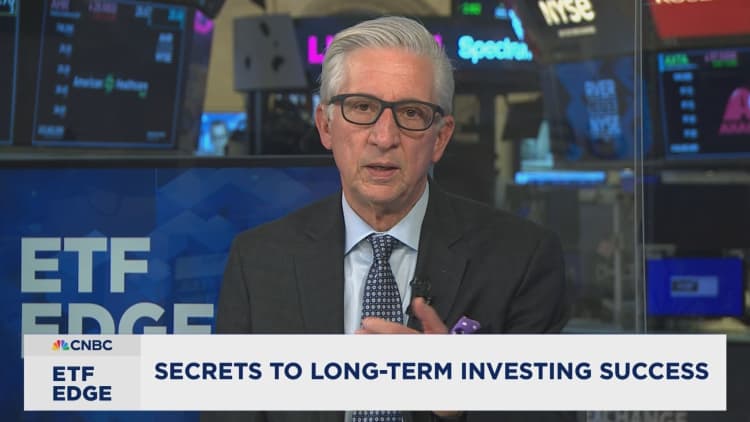
In a recent interview, index investing pioneer Charley Ellis emphasized the ongoing challenges faced by investors, stating that while the principles behind index fund success remain intact, many still struggle with inherent psychological barriers. Ellis discussed the detrimental impact of various cognitive biases on investment strategies in his latest book, “Rethinking Investing,” suggesting that recognizing and addressing these biases is crucial for long-term financial success. He advocates for the use of low-cost funds such as ETFs and index mutual funds as a strategy to mitigate these psychological pitfalls.
Market volatility and complexity can often lead investors astray, but according to Ellis, one’s mindset plays a key role in deciding the trajectory of investment outcomes. By understanding behavioral biases like the gambler’s fallacy and confirmation bias, investors can radically reshape their approach to the market, promoting better financial health over time.
| Article Subheadings |
|---|
| 1) Understanding Cognitive Biases in Investing |
| 2) The Appeal of Low-Cost Funds |
| 3) Long-Term Investment Strategies |
| 4) The Importance of Staying Invested |
| 5) Rethinking Retirement Income |
Understanding Cognitive Biases in Investing
Investing is not merely a numbers game; it is deeply intertwined with psychological factors. Charley Ellis identifies several cognitive biases that can significantly derail an investor’s strategy. The gambler’s fallacy, for instance, refers to the belief that past successes in stock picking will guarantee future success as well. Similarly, the confirmation bias leads investors to search for information that validates their preconceived notions, often missing out on contradictory data that could inform better decisions.
Herd mentality can also constrain an investor’s judgment, as many tend to follow trends rather than making independent assessments. The sunk cost fallacy is another hindrance where investors find it challenging to pull out of failing investments due to the resources already committed. Additionally, availability bias can influence decision-making based on easily accessible information, which is not always the most reliable.
By acknowledging these biases, investors can create a more robust investment mindset and devise strategies that minimize emotional influences. Ellis posits that a shift in thinking is essential to disentangling oneself from these cognitive traps that impede informed financial decisions.
The Appeal of Low-Cost Funds
In light of the psychological challenges outlined, Ellis strongly advocates for the adoption of low-cost investment vehicles such as Exchange-Traded Funds (ETFs) and index mutual funds. Compared to traditional actively managed mutual funds, ETFs generally offer lower fees, enhancing overall returns on investment. Vanguard and Fidelity are leading providers in this area, offering various index funds with minimal or even zero management fees.
The underlying argument is straightforward: reducing costs can dramatically influence long-term performance. Ellis emphasizes that these fund options not only help minimize costs but also promote a more disciplined investment approach, allowing investors to focus on the long-term growth potential rather than short-term fluctuations. Such a strategy aligns well with the need to overcome behavioral biases, as it encourages a more hands-off approach to investing.
Long-Term Investment Strategies
Adopting a long-term perspective is crucial for financial success in any market condition. Dave Nadig, another expert in ETFs, reinforces the view that an unwavering commitment to a well-chosen index fund can alleviate numerous psychological hurdles. By maintaining investments over the long run, investors can significantly decrease the influence of short-term market volatility.
Moreover, attempting to time the market is a gamble that often backfires. Market dynamics are inherently unpredictable, and trying to forecast market fluctuations leads many to miss key opportunities. Nadig highlights a critical metric: investors who miss out on just a few of the best days in the market can suffer substantial long-term losses. This empirical evidence shows that a consistent investment approach typically yields better outcomes than sporadic attempts at market timing.
The Importance of Staying Invested
The message remains clear: staying invested is vital. Nadig points out that more often than not, investors experience more positive days than negative ones in the market. By detaching from the market’s daily narratives and adopting a long-term strategy, investors can cultivate a more stable financial portfolio.
Instead of allowing themselves to be influenced by transient market events, embracing a steady investment rhythm can allow the favorable compounding effects of time to work in their favor. The discipline to remain invested reduces emotional disturbances linked to market volatility, empowering investors to stick with their plans through various market conditions.
Rethinking Retirement Income
According to Charley Ellis, it is essential to change the way one thinks about retirement income sources such as Social Security. He suggests that investors should view Social Security not merely as a government benefit but as a fundamental part of their retirement income strategy. Rethinking approaches to Social Security can encourage individuals to be proactive in their retirement planning rather than reactive, enhancing their financial preparedness.
By adopting this mindset, individuals can ensure they adequately prepare for retirement, leading to improved financial outcomes in the long run. A revolutionary shift in perspective could not only empower better financial planning but also establish a robust endpoint for each stage of an individual’s financial journey.
| No. | Key Points |
|---|---|
| 1 | Cognitive biases significantly impact investor decision-making. |
| 2 | Low-cost funds, like ETFs, offer a viable strategy to minimize investment costs. |
| 3 | Long-term investment strategies can minimize the negative impact of market volatility. |
| 4 | Staying invested is more beneficial than attempting to time the market. |
| 5 | Changing perceptions about retirement income can enhance overall preparedness. |
Summary
In conclusion, Charley Ellis highlights the critical role of cognitive biases in shaping an investor’s financial landscape. By acknowledging these biases and utilizing low-cost investment options like ETFs, investors can shape their portfolios for long-term success. A commitment to staying invested, combined with a refreshed mindset about retirement income, empowers individuals to approach their financial futures with confidence and strategy.
Frequently Asked Questions
Question: What are cognitive biases in investing?
Cognitive biases in investing are psychological factors that influence individual decision-making, often leading to detrimental financial choices. Examples include the gambler’s fallacy and confirmation bias, which can skew an investor’s judgment.
Question: Why are low-cost funds recommended for investors?
Low-cost funds, such as ETFs, are recommended because they generally have lower fees than traditional actively managed funds, allowing investors to retain more of their returns over time and increasing long-term investment effectiveness.
Question: How can investors avoid the pitfalls of market timing?
Investors can avoid the pitfalls of market timing by adopting a strategy of remaining consistently invested in their portfolios, which has been shown to yield better returns than attempting to predict market fluctuations.
